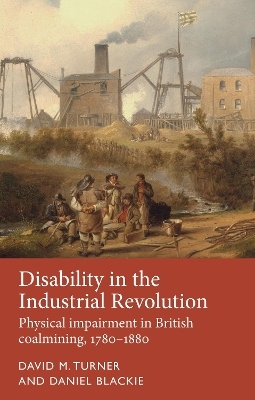
Disability in the Industrial Revolution
Physical Impairment in British Coalmining, 1780–1880
Seiten
2018
Manchester University Press (Verlag)
978-1-5261-1815-8 (ISBN)
Manchester University Press (Verlag)
978-1-5261-1815-8 (ISBN)
This book asks what happened to disabled people during industrialization by examining the experiences of those disabled in the coal industry. It presents new perspectives on disabled people’s working lives in the past, and for the first time places disabled people at the heart of the story of Britain’s Industrial Revolution. -- .
The Industrial Revolution produced injury, illness and disablement on a large scale and nowhere was this more visible than in coalmining. Disability in the Industrial Revolution sheds new light on the human cost of industrialisation by examining the lives and experiences of those disabled in an industry that was vital to Britain’s economic growth. Although it is commonly assumed that industrialisation led to increasing marginalisation of people with impairments from the workforce, disabled mineworkers were expected to return to work wherever possible, and new medical services developed to assist in this endeavour. This book explores the working lives of disabled miners and analyses the medical, welfare and community responses to disablement in the coalfields. It shows how disability affected industrial relations and shaped the class identity of mineworkers. The book will appeal to students and academics interested in disability, occupational health and social history.
An electronic version of this book is also available under a Creative Commons (CC-BY-NC-ND) license, thanks to the support of the Wellcome Trust. -- .
The Industrial Revolution produced injury, illness and disablement on a large scale and nowhere was this more visible than in coalmining. Disability in the Industrial Revolution sheds new light on the human cost of industrialisation by examining the lives and experiences of those disabled in an industry that was vital to Britain’s economic growth. Although it is commonly assumed that industrialisation led to increasing marginalisation of people with impairments from the workforce, disabled mineworkers were expected to return to work wherever possible, and new medical services developed to assist in this endeavour. This book explores the working lives of disabled miners and analyses the medical, welfare and community responses to disablement in the coalfields. It shows how disability affected industrial relations and shaped the class identity of mineworkers. The book will appeal to students and academics interested in disability, occupational health and social history.
An electronic version of this book is also available under a Creative Commons (CC-BY-NC-ND) license, thanks to the support of the Wellcome Trust. -- .
David M. Turner is Professor of History at Swansea University Daniel Blackie is a Postdoctoral Research Fellow in the History of Science and Ideas at the University of Oulu, Finland -- .
Introduction
1. Disability and work in the coal economy
2. Medicine and the miner’s body
3. Disability and welfare
4. Disability, family and community
5. The industrial politics of disablement
Conclusion
Select bibliography
Index -- .
| Erscheinungsdatum | 22.08.2018 |
|---|---|
| Reihe/Serie | Disability History |
| Zusatzinfo | 1 Maps |
| Verlagsort | Manchester |
| Sprache | englisch |
| Maße | 138 x 216 mm |
| Gewicht | 431 g |
| Themenwelt | Geisteswissenschaften ► Geschichte ► Regional- / Ländergeschichte |
| Geschichte ► Teilgebiete der Geschichte ► Wirtschaftsgeschichte | |
| Studium ► Querschnittsbereiche ► Geschichte / Ethik der Medizin | |
| Sozialwissenschaften ► Soziologie ► Mikrosoziologie | |
| Technik ► Bergbau | |
| ISBN-10 | 1-5261-1815-7 / 1526118157 |
| ISBN-13 | 978-1-5261-1815-8 / 9781526118158 |
| Zustand | Neuware |
| Haben Sie eine Frage zum Produkt? |
Mehr entdecken
aus dem Bereich
aus dem Bereich


